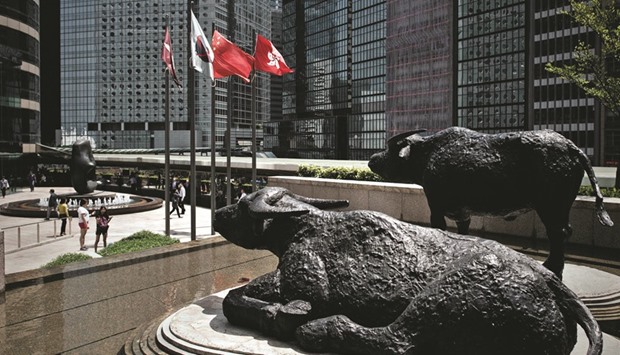Hong Kong Exchanges & Clearing will this week introduce a measure designed to help deal with extreme price swings on its stock market.
The company will on Monday roll out a volatility control mechanism for its largest securities.
The system will restrict a stock from moving more than 10% during a five-minute period once a session.
The new tool will help to stop so-called fat fingers and rogue algorithms from causing erroneous price swings, according to the market regulator.
The change comes about a month after the bourse started a closing auction for the first time in seven years after completing a market consultation last year. The new volatility control will be similar to the models used by the Singapore Exchange and Tokyo Stock Exchange.
“If it restricts the wild things then it’s great,” said Andrew Sullivan, managing director for sales trading at Haitong International Securities Group in Hong Kong. “As long as it doesn’t become intrusive, then it’s not a bad thing, because it does give that moment for the market to readjust.”
The new mechanism will be triggered if a stock climbs or drops 10% from the last traded price five minutes ago.
That would be followed by a five-minute cooling-off period during which the assets can trade only within a prescribed band.
The plan for the new mechanism prompted structured products market makers to ask the exchange earlier this year to relax requirements for providing instantaneous quotes, said two people familiar with the discussions. Structured products, such as warrants and callable bull/bear contracts, had turnover of about HK$334.2bn ($43bn) on HKEx last month, equal to more than a third of equities trading.
The exchange “has dialogs from time to time with various market participants, including product issuers,” a spokesman said by e-mail declining to provide more details.
“HKEx will continue to work with market participants to enhance their understanding of the possible impact on liquidity provision when there is a volatility control mechanism event.”
The controls will in the fourth quarter be expanded to include eight index futures contracts, according to the exchange.
The volatility control may help minimise sudden swings in stock prices, but will not stop trading in a stock or derivative for the day. BYD Co, a Chinese electric-car manufacturer, fell as much as 12% on January 7 in Hong Kong trading and closed 10% lower from the previous day after it was downgraded by Morgan Stanley.
June 24 was the most volatile trading session for the Hang Seng Index, Hong Kong’s equity benchmark, in a year. The index fell as much as 5.8% and rose as much as 0.8% in the aftermath of the UK’s vote to leave the European Union.
The Hang Seng Index fell 0.3% to 22,958.15 in Hong Kong trading on Friday.

Bull statues displayed outside the Hong Kong Stock Exchange. The bourse will introduce a measure designed to help deal with extreme price swings on its stock market this week.
